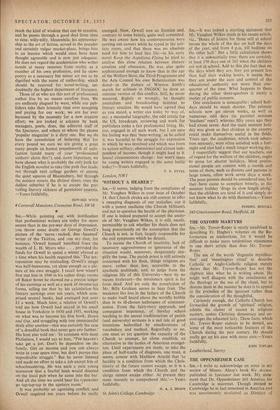SIR,—It was indeed a startling statement that Mr. Vaughan Wilkes
made in his recent article, viz., 'Hours of leisure for those still at school means the whole of the day on half the days of the year, and from 4 p.m. till bedtime on the other half.' But a little calculation shows that it is substantially true; there are certainly at least 170 days out of 365 when the children are not at school. Add to this he fact that on the days when they arc, they are present less than half their waking hours, it means that they are under the care and control of the educational authority not more than one- quarter of the time. What happens to them during the other three-quarters is surely a matter of public concern.
One conclusion is inescapable: school holi- days should be much shorter. The primary schools now get eleven weeks, as well as numerous odd days (in parental sarcasm 'teachers' rests'), whereas fifty years ago they had about seven. And the main summer holi- day was given so that children in the country could make themselves useful in the fields. Years ago, the academics, which took educa- tion seriously, were often satisfied with a fort- night and also had a much longer working clay.
I respectfully suggest that our teachers, out of regard for the welfare of the children, ought to press for shorter holidays. Most profes- sional .people are content with a month and some, of them, such as doctors and parsons in large towns, often work seven days a week. The poor parents should be considered too; for they have cause to complain bitterly, as the summer holiday `drags its slow length along: that the children are tired of it and simply do not know what to do with themselves.—Yours faithfully,


































 Previous page
Previous page